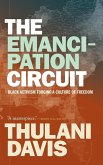Ira Berlin offers a framework for understanding slavery¿s demise in the United States. Emancipation was not an occasion but a century-long process of brutal struggle by generations of African Americans who were not naive about the price of freedom. Just as slavery was initiated and maintained by violence, undoing slavery also required violence.





![Philosophy and Opinions of Marcus Garvey [Volumes I & II in One Volume] Philosophy and Opinions of Marcus Garvey [Volumes I & II in One Volume]](https://bilder.buecher.de/produkte/41/41902/41902603n.jpg)


